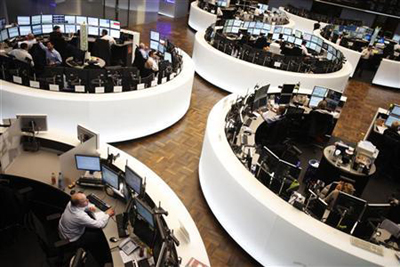Thursday, 16 July 2015 14:51
 LONDON: Stocks rose and euro zone bond yields fell on Thursday as investors welcomed Greek parliamentary approval of a bailout plan, while the dollar hit a six-week high after Federal Reserve Chair Janet Yellen reinforced expectations for a U.S. rate hike.
LONDON: Stocks rose and euro zone bond yields fell on Thursday as investors welcomed Greek parliamentary approval of a bailout plan, while the dollar hit a six-week high after Federal Reserve Chair Janet Yellen reinforced expectations for a U.S. rate hike.
Relief was the dominant sentiment across European markets, ahead of the European Central Bank’s monthly policy meeting later in the day, as Greece’s approval of the painful measures lessens the likelihood of Athens’s immediate exit from the euro zone.
The FTSEurofirst 300 index of leading European shares rose 1 percent to a six-week high of 1,602 points, continuing the upward momentum across Asian stock markets, while Spanish bond yields fell to a six-week low.
The relief is likely to be temporary, however. The political climate in Greece is fragile, it remains to be seen whether the measures approved will be implemented, and as the International Monetary Fund said this week Greece’s debt is unsustainable.
Also, Germany’s finance minister repeated his view on Thursday that a temporary “Grexit” is a good idea.
But for now, investors are willing to give a cautious thumbs up.
“The latest Greek events should support risky assets,” Unicredit said on Thursday.
Euro zone stocks rose 1 percent to 3,667 points, and Germany’s DAX rose 1 percent to 11,660 points, both six-week peaks.
Euro zone financial stocks outperformed, rising 1.5 percent .
U.S. stock futures pointed to a rise of 0.4 percent at the open on Wall Street. Second quarter earnings reports from blue chips such as Citi, Goldman Sachs and Google are scheduled for later on Thursday.
Earlier, Japan’s Nikkei rose 0.7 percent, Shanghai stocks rose 0.5 percent and MSCI’s broadest index of Asia-Pacific shares outside Japan was up 0.3 percent.
FED LIFTOFF IN SEPTEMBER?
The Greek parliament passed a sweeping bundle of austerity measures demanded by European partners, a price to pay for opening talks on a multi-billion euro bailout package near-bankrupt Athens needs to stay in the euro zone.
Ten-year Spanish bonds, often seen as a barometer of investor confidence and risk appetite, rose in price to push the yield down to a six-week low of 2 percent.
The German 10-year yield was steady at 0.77 percent and benchmark Treasury yields were up 3 basis points at 2.38 percent.
Investors in Europe will now turn their attention to the ECB meeting and in particular what president Mario Draghi says about the funding of Greek banks, which have been closed for over two weeks.
U.S. bonds and currency markets took their cue more from Fed chair Janet Yellen’s testimony to Congress on Wednesday than events in Greece. Yellen repeated her view that the Fed will likely hike interest rates this year if the U.S. economy expands as expected.
The favourable interest rate outlook lifted the trade-weighted value of the dollar to a six-week high of 97.4 on Thursday, and pushed the euro to a six-week low of $ 1.09.
“Although our baseline is a December hike, the probability of a September hike remains significant,” Goldman Sachs U.S. economics team said in a note to clients.
Elsewhere in currencies, the Canadian dollar was at C$ 1.2940 per U.S. dollar after touching C$ 1.2958, its lowest since March 2009 after the Bank of Canada on Wednesday cut interest rates for the second time this year.
The New Zealand dollar slumped after weaker-than-expected inflation data and plunging dairy prices cemented expectations for a rate cut there as early as next week.
The kiwi skidded to $ 0.6498 a low not seen since July 2009.
In commodities, crude oil held its ground after data showed that U.S. crude inventories dropped and refinery demand was high.
U.S. crude rose 0.2 percent to $ 51.53 a barrel after dropping 3 percent on Wednesday when expectations that increased exports from Iran will add to a global supply glut. Brent was unchanged at $ 57.02 a barrel.
Tuesday’s nuclear agreement between six world powers and Iran is expected to result in the lifting of sanctions, which have limited sales of Iranian oil for several years.
Gold struggled under the weight of the strong dollar, slipping back towards Wednesday’s four-month low of $ 1,142 per ounce.



























